|
The
Glow-Pad Project
Computer Customization, Personalization and Modification.
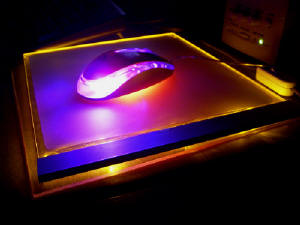
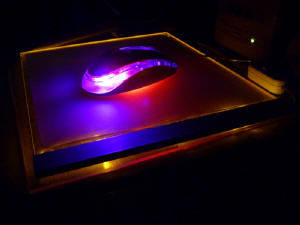
Introduction
In mid
2003, I changed my computer and got a brand new one. One thing I did
not like was the mouse pad - that thin piece of plastic which had ugly
design. Instead of getting a new normal mouse pad, I decided to make
my own glowing mouse pad. In the realm of computer modding
(modification), this is probably one of the simplest and basic things
one can do. Basically, by using the power from a USB outlet, we light
up several LEDs of any colour into a piece of clear
acrylic/Perspex/lexan. The edges will glow up, creating a nice even
glow which makes a lovely addition to any desktop, which is exactly
what I wanted with my new computer - to create a refreshing new look.
~
This
page documents my glow pad updates, and include comprehensive
construction details so that you can make your own glow pad. With the
right materials, it can be easily assembled in one afternoon.
June
2003

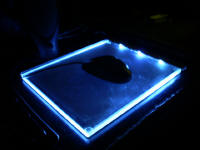
The glow
pad is born. Blue was chosen - 3 ultra bright blue LEDs were
used. Here is a list of the materials used:
1. 8mm
thick Acrylic (size depends on your mouse pad size)
2. Suitable mouse pad to put on top of the acrylic.
3. 4 Clear Rubber Legs
4. 3 5mm Ultra Bright 3V LEDs at 20mA. Whichever colours you want.
5. Aluminum Bracket to hid circuit
6. 39ohm Resistor
7. Insulated wires
8. Insulating tape
9. Soldering Iron
10. USB head / cable
11. Switch
12. 5mm Drill Bit
13. Drill
Construction
details.
Step 1:
I
used 8mm thick acrylic. Too thin and it will be difficult to drill the
holes of the LEDs. Too thick and it will fell uncomfortable. The
thickness is up to you. I sawed mine to a 23x27cm size. Always
remember to leave at least a 1cm border on one side to allow drilling
the holes for the LEDs, and gluing the metal bracket down to conceal
the electronics. Once sawed to the desired size, I clamped the acrylic
down and drilled 3 holes, equally spaced apart at the side of the
acrylic.


1. As long as the LED fits in, it's fine.
2. Acrylic with 3 holes drilled
Remember not to take off the protective covering until project is
complete. It is to keep away all your greasy fingerprints and the
scratches.
Step 2:
This glow
pad runs on a USB connection. USB has an output of 5VDC, and we will
be using this to power our LEDs. First splice up
your USB cable. There should be 4 wires inside. We only need 2.
Red and Black: The 5V power
Green and White: Data Wires. We won't need that.
Here's my
circuit and how I wired them up.

Try
to keep it as neat as possible. Once done, solder them together. I
insulated all connections with heat shrink.


1. Everything wired up and soldered.
2. Soldering Iron and the soldering lead.
Step 3.
Plug
it in the USB to test. If you soldered everything correctly, it should
look like this:
 It lights up! Ultra blue and bright!
It lights up! Ultra blue and bright!
 Plugged in the USB with a nice cable :)
Plugged in the USB with a nice cable :)
I used
double sided tape to attach the aluminum bracket to the acrylic...
that's before I get my epoxy.
Now
all you need to do now is to remove the protective covering, stick the
4 rubber legs and add your mouse pad on it. I am using a frosted sheet
of plastic as the mousepad. It fits well with blue and has that cool
frosty feeling.


1. View from top
2. The aluminum bracket hides everything
This is my
completed glow pad.
Cost of Items
1. 23cm x
27cm x 8mm clear acrylic - $8
2. Mouse pad material from Art Friends - $0.95
3. 4 Clear Rubber Legs - $4 for a pack of 14
4. 3, 5mm Ultra Blue 3V LEDs at 20mA. - $1.80
5. Aluminum Bracket - $1
6. 39ohm Resistor - free
7. Insulated wires - $1
8. Insulating tape - nil
9. Soldering Iron - nil
10. USB head / cable - $3.00
11. Switch - $0.50
12. 5mm Drill Bit - $2.00
13. Drill - nil
Total
cost: ~19.40
More photos:
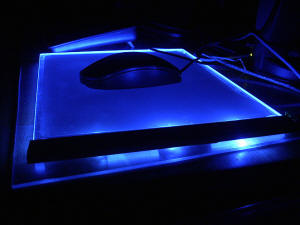
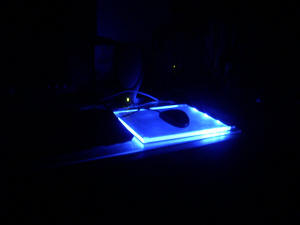
1. Glow pad at night..
makes a good night light. ::
2. The glow pad illuminating the surrounding.
Glow Pad -
Revision
In
February 2004, the double sided tape had totally lost the stickiness
and came off. There were also some connection problems resulting in
the LEDs not lighting up. I decided to redo the circuit. This time, I
changed the blue LEDs with orange LEDs, for a change. I also added a
nice switch and made the pad neater. The aluminum bracket was attached
with a two part epoxy for a strong and permanent bond. I also bought a
new optical mouse - A4 Tech Rainbow. It's a nice orange optical mouse
with really lovely colours. This is the final result and is
really quite lovely especially at night.


This is
the current glow pad I am using.
10 June 2003
Revised: 28th Feb 2004
(c) Gao Guangyan
|

